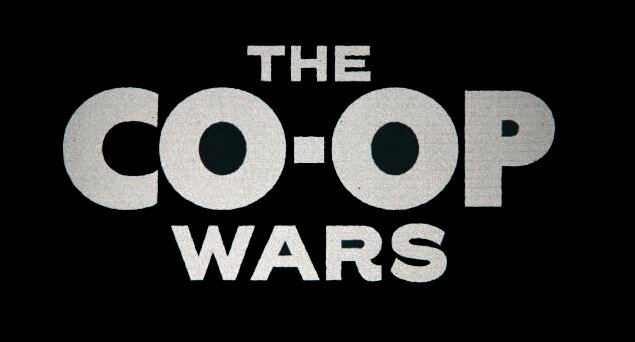“A gripping and important documentary... offers valuable lessons for present and future cooperators.”
“An important and previously-untold story... should especially interest co-op founders, board members, and staff.”
“Many of the issues faced in the 70s still face cooperatives today. Everyone should see it.”
THE CO-OP WARS is a one-hour documentary that tells the story of the tumultuous early years of the Twin Cities’ natural food co-op movement, the largest in the US.
Inspired by their experiences in rural communes and hippie collectives, young radicals began a series of ever-expanding food retail projects that led to the creation of the Cities’ first natural food co-op. Its success sparked an explosion of food and other co-ops in the area, forming a cooperative economy unparalleled in the rest of the country.
But this burgeoning alternative sphere ran afoul of the divisions in the Post-Vietnam War counterculture. While some were inspired by the potential for alternative institutions to change society by example, others looked to the Marxist revolutionaries who were advancing in the Third World. These included a secretive group who set out to forcibly take over the co-ops and re-orient them towards the recruitment of working-class revolutionaries.
The ensuing struggle inspired a debate as to who and what the co-ops were for, bringing up issues of racial inclusion, class division, and the role of politics in the movement.
The film closes with an incident that shows that some of the same dynamics present in the Co-op Wars continue in today’s cooperative community. In 2015, a co-op that sought to open a new location in order to better serve a diverse neighborhood known as a “food desert” was charged with racism and gentrification by activists.
The resolution of this controversy points to both the persistence of inequality in the food system and a way forward through renewed community engagement.
CHARACTERS
We tell our story through the first-hand accounts of eighteen participants in the Co-op Wars from all sides of the struggle. Meet just a few:
Theophilus Smith
The mysterious founder of the Cooperative Organization (CO), “Smitty” claimed involvement in the Student Nonviolent Coordinating Committee and the Dodge Revolutionary Union Movement. Mixing orthodox Marxism-Leninism with psychological control, the CO later devolved into a cult, most of whose members never knew the identity of their leader.
Dean Zimmerman
After fighting for voting rights as part of Mississippi Freedom Summer in 1964, Dean threw himself into the food co-op movement, helping to start North Country Co-op and assisting with co-op start-ups across the Midwest. A CO member who became critical of their tactics, he later served as a Green Party member of the Minneapolis City Council.
Suzanne “Suzy” Shroyer
After becoming intrigued with the health and political benefits of organic, whole foods while at the Georgeville Commune, Suzy was critical to founding the People’s Pantry, which evolved into North Country Co-op, the first natural foods co-op in the Twin Cities. An inveterate counterculture entrepreneur, she also founded People’s Clothes.
Lori Zuidema
Becoming one of Seward Co-op’s first workers at age 18, Lori went on to co-found the Cheese Rustlers, a collective of women distributing cheese to the co-ops. As part of a wave of women who found leadership opportunities in the co-ops, she later served in executive roles at Roots and Fruits Cooperative Produce and Co-op Partners Warehouse.
Gary Cunningham
After a period of homelessness, Gary was taken in by his uncle, Moe Burton, a former Black Panther who founded Bryant-Central Co-op. Initially allied with the CO, they found themselves under attack when they refused to give up their co-op’s autonomy. Gary is now a national leader for economic equity at Prosperity Now and the former First Spouse of Minneapolis.
Dave Gutknecht
An important draft resistance activist who served time in federal prison after his own landmark case, Dave found himself targeted by the CO when he resisted their takeover of Mill City Co-op. Dave spent his later career as a dedicated food co-op journalist and historian, helping the co-ops learn from each others’ successes and struggles.












